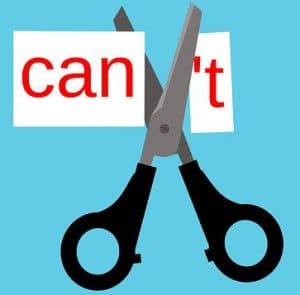Confidence: The Big Sister of Financial Success

The main hindrance that prevents women from reaching their ultimate financial success is self-confidence. Following closely behind is low confidence in the industry and a lack of support from the surrounding environment. In fact, according to research by Bank of America Merrill Lynch only about half (52%) of women say they are confident in managing investments.
Women lack confidence
It’s a familiar story that I have heard from many clients, repeatedly, and it usually goes like this:
‘I have savings that I simply keep in cash as I am scared to invest.’ ‘I am not sure what to do with my money and if I should invest.’ ‘Investing is too complicated and really not for me’. ‘I don’t like talking about money with anyone.’ ‘I am scared to talk to others about money because I don’t know enough.’ ‘Investing is complicated and I don’t have enough knowledge’. ‘I never look at my bank account and just hope for the best’.
 Admit it. As a woman, the question about money, finance or investing is the one you secretly dread and try to avoid by all means possible. So what? This fear that takes over where money is concerned leads women to put off taking any action when it comes to their personal finance until much later than they should. Time and time again I have had women in their 40s or even 50s come to me ready to take the first steps towards caring for their finances. Needless to say it is far too late and it is simply impossible to recuperate what has been lost over those decades of inaction.
Admit it. As a woman, the question about money, finance or investing is the one you secretly dread and try to avoid by all means possible. So what? This fear that takes over where money is concerned leads women to put off taking any action when it comes to their personal finance until much later than they should. Time and time again I have had women in their 40s or even 50s come to me ready to take the first steps towards caring for their finances. Needless to say it is far too late and it is simply impossible to recuperate what has been lost over those decades of inaction.
And you know what? Once they get into it, they realise that the biggest mistake they made was not starting earlier. In fact, 41% of women report that their highest financial regret is not investing more.
What do women miss out on?
Let’s dive in. For starters, the effect of compounding means that the earlier you start the more you will have in the future. For example, if you start saving or investing at the age of 25 with £15,000, assuming an annual rate of return at 5.5%, at the age of 50 you will have £57,200. If, however, you start 10 years later, at the age of 35 with exactly the same amount of £15,000 and same assumed annual rate of return at 5.5%, by the time you are 50, you will only have £33,500. That is a staggering amount that you miss out on in just 10 years. £23,700 less in your bank account, because you put off the one action that should be your number one priority: Personal finance.
Furthermore, by letting your lack of confidence take over, you are not utilising the full financial potential you have, which hinders your day to day life. If you think I am exaggerating, I am not. You can end up consumed by financial stress and worries of everyday life that has negative effects on your happiness that in turn negatively affects your health. It can put a lot of strain on your family life as well. I will go even further to say that all of this can shorten your life all together. You deprive yourself from enjoying what makes you happy. You keep dreaming of a better life that never seems to be within your reach. Eventually when you do decide to take action you regret not having done that years ago, because you realise that you could have been living your dream life instead of just dreaming about it.
61% of women would rather talk about their own death than money.
The internal lack of confidence is up to us to work through. The problem becomes even deeper due to a number of external factors that hinder women’s confidence even further.
First of all, there is a social taboo around talking about money, personal finance and investment experiences that weighs down on confidence.
Secondly, women’s media is largely complicit and does not often contribute smart and open dialogue about money, lifelong wealth planning and investing questions and needs. In fact, the same research paper by Bank of America Merrill Lynch, reviewed 1,594 pages of editorial content in the March 2018 issues of the top 17 women’s magazines to find only 5 pages covering personal finance. That is less than 1%. It is absolutely shocking to read such statistics in 2020.
Finally, lack of confidence in the financial industry hits the final blow to the overall confidence of women when it comes to finance and investing. A study by Ernst and Young revealed that the words mostly used by women when describing the financial and wealth management industry have only negative connotations, such as – “complicated”, “unwelcoming”, “patronising” and others.
What can you do about it?
First and foremost, take action today, not tomorrow, not next Monday, not when you get paid. Now!
Follow a 3-step approach to get you started.
 Begin by starting to consciously work on your wealth mind-set. Really dig deep and think about how you have been conditioned when it comes to money and wealth. What comes to your mind when you think about money and wealth. What was said around these topics in your family when you were growing up. Identify the negative thoughts and focus on changing them by associating wealth and money with positivity. Wealth can bring a lot of good by allowing you to focus on what matters to you most. There is no shame to always want more and reach higher. When you eliminate your own financial stress, you will be able to elevate others.
Begin by starting to consciously work on your wealth mind-set. Really dig deep and think about how you have been conditioned when it comes to money and wealth. What comes to your mind when you think about money and wealth. What was said around these topics in your family when you were growing up. Identify the negative thoughts and focus on changing them by associating wealth and money with positivity. Wealth can bring a lot of good by allowing you to focus on what matters to you most. There is no shame to always want more and reach higher. When you eliminate your own financial stress, you will be able to elevate others.
 Second, get on top of your finances. Know exactly what comes in and what goes out and start making adjustments to reduce your expenses. Actively work to increase your income by diversifying your income streams. Think about adding a side hustle or a passive income source. Make a plan and start paying off your debt consistently. Step by step start changing your habits to help you spend smarter and save more.
Second, get on top of your finances. Know exactly what comes in and what goes out and start making adjustments to reduce your expenses. Actively work to increase your income by diversifying your income streams. Think about adding a side hustle or a passive income source. Make a plan and start paying off your debt consistently. Step by step start changing your habits to help you spend smarter and save more.
Third, read and listen to as much as you can around the topics of mind-set and finance to increase your knowledge and learn from others.
“You are the only problem you will ever have and the only solution. Change is inevitable.
What needs to change for change to happen?
 There is a need for more education and transparency in the financial industry. Companies providing financial advice should take on the task to also provide financial education alongside full transparency about their products, fees, investment strategies etc.
There is a need for more education and transparency in the financial industry. Companies providing financial advice should take on the task to also provide financial education alongside full transparency about their products, fees, investment strategies etc.
There is a need for a better understanding of female clients’ goals and priorities as women do make more value-based decisions for themselves and their families, rather than just going for the bottom line. When you bring values into the conversation it makes all the difference.
Media should shift their focus to include more financial content for their female audience and to highlight financial role models. In fact, 45% of women say they do not have a financial role model.
“Great things are done by a series of small things brought together.” – Vincent Van Gogh








